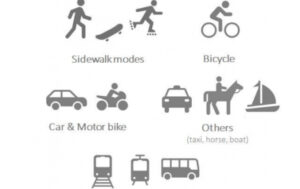A small transition or a major change in their daily travel autonomy?
In the context of urban transformation, children’s mobility is a field of study in the social sciences that has been growing rapidly over the last twenty years. In this research, 10 researchers, including Sylvestre Duroudier, a member of Géographie-cités Laboratory, aim to understand how children’s autonomy evolves during a “normative transition” from elementary (T1) to middle school (T2).
In the context of a large metropolitan area comprising a mix of different, more or less urbanized spaces, this study examines children’s spatial autonomy beyond the classic approaches. The current challenges of the energy transition show a growing need for the use of “soft modes of travel” (cycling, walking) which implies a better understanding of the springs of children’s autonomy including their ability to cope with various spaces and social situations.

Travel modes groups distinguished for analysis
Children’s autonomy is studied through daily independent travel, types of places visited as well as by observing children’s ability to deal with unexpected and unfamiliar situations.
Based on a longitudinal Mobi’kids survey using mixed methods (GPS travel/stop data; data from prompted recall interviews with children), children’s autonomy (based on independent travel, types of places visited and the ability to deal with unexpected situations) was analyzed over two periods (T1, n=86 and T2, n=56). The results show differences in mobility habits between the suburban and city children (in both T1 and T2), but also the same evolution trend in terms of independent travel while attending middle school (T2). The normative transition seems to have a role in some travel patterns and consequently on a few coping strategies to deal mainly with unfamiliar contexts.
This article was made possible by financial support provided by the National Research Agency that funded the Mobi’kids program (ANR-16-CE22-0009). The Mobi’kids project aims to understand the conditions for the daily mobilities of families, including the evolution of those of children (who are learning independence) in a context of the transformations of lifestyles bolstered by the challenges of the sustainable city.
 Sylvestre Duroudier was a post-doctoral student at Laboratoire Ville mobilité Transport and is Senior Lecturer at Université Paris 1 Panthéon-Sorbonne. He is developing research on segregation, mobility and spatial analysis. He is member of Géographie-cités Laboratory.
Sylvestre Duroudier was a post-doctoral student at Laboratoire Ville mobilité Transport and is Senior Lecturer at Université Paris 1 Panthéon-Sorbonne. He is developing research on segregation, mobility and spatial analysis. He is member of Géographie-cités Laboratory.


